
Learners Voice
Are we really listening?
This weekend, a public holiday in the UK respecting international workers day or simply a spring festival subject to how you’re loaded, has seen #EduTwitter (aka Blob 2.0) lamenting that parents are exerting their voice by boycotting yet another round of pointless tests for children as young as 6 years of age.
Seriously, I wonder who these self-appointed or sometimes government appointed child catchers think they work for? Rhetorical question of course because I’ve answered it in my question.
I have had the pleasure of visiting some incredible schools mostly in the state sector and globally from active conflict zones to Silicon Valley and the thing I’ve learned is that great schools can’t and shouldn’t try to “scale” but they should “inspire”. Education is context and student sensitive, there is no one size fits all and if there was we would end up with an intellectual monoculture that would kill innovation and creative thinking. When the term “factory” is used to describe schools it is used as a metaphor to describe industrialised institutions that are a cancer to the advancement of our species.

Ivan Illich argued in his book “Deschooling Society” (1971) that schools, like prisons, offices and factories have become industrialised instituations hence their similarity in the forms of rules, behaviours and organisation. Foucault goes further and suggests that “Knowledge is Power” and as a result the dominant culture not only uses knowledge to accumulate power but creates and distributes knowledge to maintain it. When I interviewed Chomsky he told me that he thought:
“The highest goal in life is to inquire & create, to search the riches of the past that are significant to you and to carry that quest for understanding in your own way.
The purpose of education is to help people to determine how to learn on their own.
Another concept is that education is simply indoctrination, to follow orders, accept existing systems, not challenge and so on.”

I recently had the opportunity to address an audience of more than 2,500 teenagers at a school in Dubai about the future of school and learning, it’s purpose and it’s relevance. It was a great honour and one of the highlights of my short tour there addressing a variety of corporate, government and educational organisations.
I asked the students a question about whether they felt that they had a voice in the discourse about their future and the design of schools. It was a tumbleweed moment with just a few hands waving suggesting that they did. I have since however received many private messages on the subject and this one from “Aabha” aged 13 was especially poignant:
I was one of the students who were present during the talk you had at Indian High School. I remember you asking us if students got opportunities to tell the world what we think. I’m not sure if it was insecurity, uncertainty or just plain shyness, but I didn’t get up to tell you the truth. In fact, no one did.
So here’s the answer. Yes, we get many opportunities. But the problem is, no one considers what we say. Everyone thinks that we are just children who don’t understand what we are doing. If we raise a question which cannot be answered, people dismiss it.
I honestly think that someone who thinks in a way that favours both imagination and practicality, he can reach great heights. Even if he doesn’t achieve success, if he thinks that he has achieved the gift of thought, he has achieved success.
By the gift of thought I do not mean plain, boring thinking that everyone can do. I mean the way of thinking differently than most people. Even if a person’s academic records aren’t very good, the way he thinks can be quite extraordinary. If you explain basic formulae to him, he may come up with something that hasn’t even crossed anyone’s mind.
Now, if you take the case of someone who imagines too much and doesn’t think practically, he may make up theories which, to be honest, can be very ridiculous. If a person is like a robot and doesn’t do any thinking of his own, no matter how excellent his academic records may be, he is nothing without imagination. All he will do is take a formula and replace the digits and he’ll get the answer. He won’t think of other ways to do the job.
The thing is, no one considers anything a person who thinks in a way that favours both imagination and practicality says because they are not following what society wants them to follow. They are taking the path others haven’t taken, because they want to. Not because society tells them to.
If you don’t understand what I’m trying to say, think of the quote,” Imagination is more important than knowledge.”
Now imagine it said by someone who is in the middle of high school. The person would be considered as someone who doesn’t value knowledge and has their head in the clouds. Now, if you imagine it in the mouth of the person who actually said it, Albert Einstein, it is a brilliant thought.
I think it’s time that we started listening to all the user groups and stakeholders in education — that includes the learners and the parents, in fact, society as a whole.
What is school for?
You can find more of my writing here and join my mailing list here
Thank you for reading. I appreciate feedback so if you like this post and would like others in your network to catch it please touch the heart/recommend button below, share via social media or feel welcome to add your thoughts as a response post.

An entertaining & thought provoking slayer of sacred cows, Graham Brown-Martin works globally with senior leadership teams to help organisations adapt in the face of rapid change & innovation. By challenging entrenched thinking he liberates teams to think in new ways to solve complex challenges. His book Learning {Re}imagined is published by Bloomsbury and he is represented for speaking engagements via Wendy Morris at the London Speakers Bureau.











